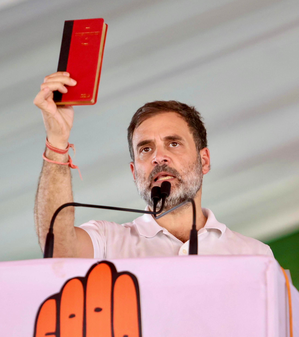The Election results have been remarkable in many ways. The country appears to have realized the dangers associated with divisive politics of any kind. Religious symbolism has been rejected by the masses, which has proved its strong belief in India’s secularism, which respects all religions. Calls from the highest level to keep Muslims out on the ground of reservation being given on the basis of religion have also largely been rejected. What the call in effect meant was the denial of reservation to Muslims on the ground of religion. If the election campaign has largely been peaceful, its credit goes primarily to the opposition parties, which refused to get dragged into communal conundrum.
One person who has attracted the attention of everybody has been Rahul Gandhi who has emerged as a true leader of the masses. He has spoken not on behalf of any particular community, caste or region, but on behalf of the people of the country. He has been highly successful in advancing his socioeconomic ideology, which supports business and growth but rejects the domination of few corporates. He has clearly understood the fact that now, more than poverty, it is Economic Inequality at the much greater level, which needs to be addressed. The truth is that becoming 5th or 3rd biggest economy in the world has no meaning if it is associated with huge economic inequality within the country. If the country has to develop, every single community, every single caste and every single region will have to develop; and this requires huge shakeup in the economic system. Wealth Tax will have to be introduced and expanded, and GST and Income Taxes will have to be lowered. Growth has to be in terms of the goods and services rather than merely in terms of the GDP, in which inflation plays a big part. It is high time Rahul Gandhi embarks upon a national campaign on these issues and opens a way for a grand revolution on these fronts.
I remember having met Rahul Gandhi in 2012 when I was called for a meeting with him. I found him a truly simple man and keen to understand the others’ point of view. I gave him a presentation, which had two parts, first being about the country as a whole, and second about Muslim empowerment within the secular fabric of the country. Unlike most political leaders, he looked keen to discuss on the issues giving the others time and space to explain their viewpoints. In that very meeting, I had got convinced that he will ultimately emerge as the true leader of the nation.
Hopefully, things will start changing now. Hopefully, every political dispensation in the country will realize that unity in diversity needs to be not only fully understood but also to be applied in every field. India’s secularism, unlike in the West, does not mean negation of religion. It means equal respect to all religions and equality of all religious communities. Religious as well as political leaders need to realize that all communities need to unite on the ground of common religious morality rather than hate one another on the ground of different religious identities. And this bond should reflect in every field and every region. Hopefully, future will be safer, healthier and more peaceful and prosperous for every single citizen of the country.






0 Comments